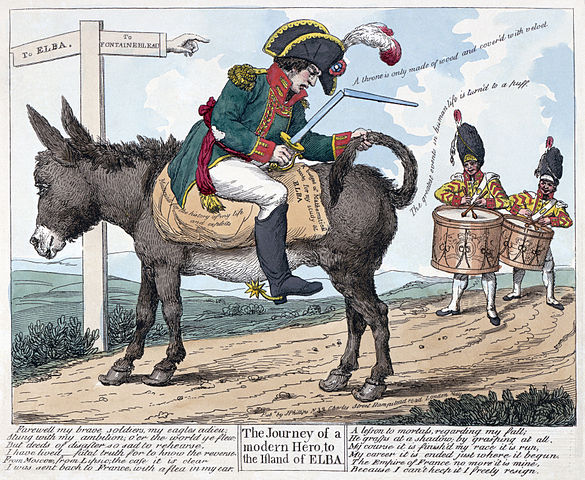100 Years Later: The Christmas Truce of 1914
I've run this post before, but I don't think there is any historical Christmas story more appropriate to tell this year. A hundred years ago, men on the Western Front stopped fighting and celebrated the holiday together.

German and British soldiers photographed together in No Man's Land on the Western Front.
For most of us, the most vivid images of World War I are the trenches on the Western front. Men dug into positions on either side of a no-man's land of craters and burned out buildings. Barbed wire and sandbags provided little protection from enemy shelling or snipers; they provided no protection from rats, lice, flooding, or the dreaded "trench foot". The battlefields were noxious with the smell of rotting corpses, overflowing latrines and poison gas fumes.
Trench warfare was hell. It also made possible one of the most extraordinary events of the war: the unofficial Christmas armistice of 1914. The truce began when some German troops decorated their trenches with candles and Christmas trees and sang carols. British troops responded with carols of their own. On Christmas Day, some groups ventured into "no-man's land" to share food, sing carols, hold joint services for their dead and play soccer matches.
One German soldier, Josef Wenzel, described the scene in a letter to his parents:
One Englishman was playing on the harmonica of a German lad, some were dancing, while others were proud as peacocks to wear German helmets on their heads. The British burst into a song with a carol, to which we replied with "Stille Nacht, heilige Nacht. It was a very moving moment--hated and embittered enemies were singing carols around the Christmas tree. All my life I will never forget that sight.
It is estimated that 100,000 men took part in the Christmas truce. In some places, the truce lasted only through Christmas day. In others, it lasted until New Year's Day. In some sectors, the war continued unabated.
The Christmas truce did not recur in 1915. Both the British and the German high commands were appalled at the blatant fraternization with the enemy and gave strict orders against future incidents. After all, how do you fight a war if the men at the front decide not to fight?
Peace on earth, good will to men.
ADDENDUM:
My friend Nancy Friesen brought this lovely version of the story to my attention:
Thanks, Nancy.
Photograph courtesy of the Imperial War Museum.
1814: The Year in Review

I wish I could tell you that 1814 was a year of peace compared to 1914--but it wouldn’t be true. In fact, the two years look an awful lot alike--emphasis on the awful. The allied powers of Europe fighting an aggressive empire. A generation of young men damaged by war. Belgian fields trampled into mud by booted feet.
Here are some of the highlights (or low points, depending on your point of view):
The British burned Washington D.C. during the War of 1812, much of which actually took place in 1814. (From the American perspective, the War of 1812 was a final blow for independence. From the British perspective, it was an annoying distraction from their war against Napoleon.)
Among the buildings burned was the fledging Library of Congress. Thomas Jefferson offered to sell his private library (6487 books!) to Congress as a replacement. It was a good deal for both the American people and Jefferson, who was good at just about everything except managing his money.
Mexico took advantage of the confusion caused by the Napoleonic Wars and declared its independence after three hundred years of Spanish rule.
Napoleon was exiled to Elba Island with a pension from the French government. He was given sovereignty over the island and allowed to retain the title of Emperor. How could anyone have thought this would turn out well?
Sir Walter Scott published his first novel, Waverly--which went on to become the first international bestseller.
What would you add to the list?
1914: The Year in Review
Like most people who write about history online, this year I’ve spent a lot of time and virtual ink on the beginning of the First World War this year. * It’s easy to forget that the assassination of the Archduke Ferdinand and Europe’s tumble into war wasn't the only thing that happened in 1914.

Here are some of the highlights:
James Joyce published Dubliners and Edgar Rice Burroughs published Tarzan of the Apes. You could argue that Tarzan was the more important in terms of the extent of its cultural influence.
Charlie Chaplin made his first film: an improvised short titled Kid Auto Races at Venice.
Sir Ernest Shackleton set out on his third and most famous expedition to Antarctica. His ship, the badly named Endurance, was crushed by ice and Shackleton and his crew floated on sheets of ice for months.
The first ship sailed through the Panama Canal, ending its journey on August 3. No one paid much attention because German troops marched into neutral Belgium the next morning.
The first electric traffic light was installed--not in New York, Paris, or London but in Cleveland, Ohio, at the corner of Euclid and 105th
* Ten posts since June. Unless the Marginites rise up and scream “no more WWI! Please!”, there will be more to come over the next few years.